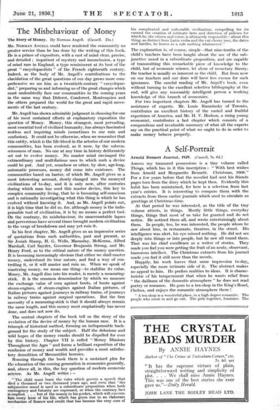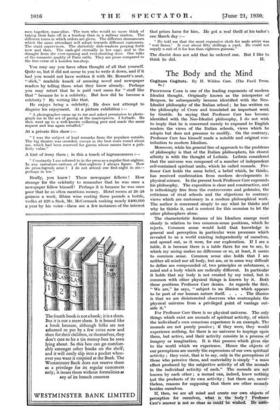A Self-Portrait
Arnold Bennett Journal, 1929. (Cassell, 7s. 6d.) AMONG my treasured possessions is a tiny volume called Things, which has in it this inscription : " With best wishes from Arnold and Marguerite Bennett. Christmas, 1908." For a few years before that the novelist had sent his friends pages torn from the diary which he kept then. Evidently this habit has been maintained, for here is a selection from last year's entries. It is interesting to compare them with the extracts, from those earlier journals which used to circulate as greetings at Christmas-time.
At that period he was interested, as the title of the tiny volume attests, in things. Mostly little things, everyday things, things that most of us take for granted and do not notice. He noticed them all, and wrote entertainingly about them. In people, too, he was interested, the people whom he saw about him, in restaurants, theatres, in the street. His intelligence was alert, his eye missed nothing. He did not see deeply into things or into people, but he saw all round them. That was ,his chief excellence as a writer of stories. They made you feel you were getting the fruit of an acute, observant, humorous intellect. The Christmas extracts from his journal made you feel it still more than the novels.
Happily, his work leaves that same impression to-day, especially the more intimate side of it. The abstract makes no appeal to him. He prefers realities to ideas. It is charac- teristic of his temperament that when he wants relief from " the dailiness of the domestic atmosphere " he does not read poetry or romance. He goes to a tea-shop in the King's Road, Chelsea, and enjoys the romantic atmosphere there !
" A tea-shop is a wonderful place, in a high degree romantic. The people who come in and go out. The girls together, feminine. The
men together, matieuline. Theinen who would no 'more think of taking their hats off in a teashop than in a railway atation. The different tones in which orders are given. The different demeanours which the same attendant will adopt towards different customers. The staid supervisors. The slatternly dish-washers peeping. forth now and then. The cash-girl eternally in her cage, and in the draught from the ever-opening and ever-shutting door. One talks of the romantic quality of Paris caf4e. They are prose compared to the free-verse of a London tea-shop.
You may say you have often thought of all that yourself. Quite so, but it did not occur to you to write it down, and if it had you would not have written it with Mr. Bennett's neat, " slick," readable knack of amusing novel and newspaper readers by telling them what they know already. Perhaps you may retort that he is paid vast sums for " stuff like that " because he is a celebrity. But how did he become a celebrity ? By writing like that.
He enjoys being a celebrity. He does not attempt to disguise his enjoyment. At a picture exhibition :-
" A photographer came up to me and asked permission to photo- graph me in the act of gazing at the masterpieces. I forbade. He then went up to a well-known collecting peer and made the same request and was again rebuffed."
At a private film show :-
" I was the subject of loud remarks from the populace outside: The big theatre was crowded, except in the best seats round about me, which had been reserved for guests whose names have a pub- licity value."
A hint of irony there ; in this a touch of ingenuousness :— " Constantly I am referred to in the press as a regular first-nighter. In any caricature-cartoon of first-nighters I always figure. How do press-legends arise ? I do not attend one first-night in six— perhaps in ten."
Really, you know These newspaper fellows ! How strange for the celebrity to remember that he was once a newspaper fellow himself! Perhaps it is because he was once poor that he so often mentions money. Hotel rooms at 26-28 guineas a week, Rhine wine costing three pounds a bottle, vodka at £20 a flask, Mr. McCormack making nearly £400,000 a year by his voice—these are a few instances of the interest that prices have foi him.. Be got _a 'rear thrill at his tailor's one March day " He told me that the most expensive cloth for male attire was ' real llama.' It cost about fifty shillings a yard. He could not supply a suit of it for less than eighteen guineas."
The diarist does not add that he ordered one. But I like to









































 Previous page
Previous page